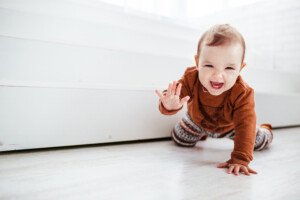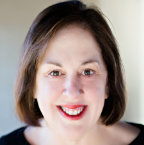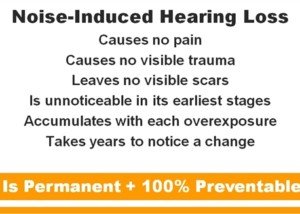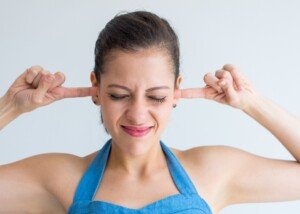
Some babies don’t flinch or seem uncomfortable in loud environments, and parents may think this means their baby’s ears won’t be harmed by the noise, or that perhaps there’s already hearing loss.
“Baby exposure to loud noise can cause inner ear damage,” says Dr. Lisa Lewis, MD, a board certified pediatrician in Fort Worth, Texas, and author of “Feed the Baby Hummus, Pediatrician-Backed Secrets from Cultures Around the World.”
Dr. Lewis explains, “The inner ear is still developing and is more sensitive to loud noise. Repeated loud noise exposure, such as a loud concert, could definitely put the baby at risk of hearing problems later.”
If a baby suffers immediate hearing loss (which is possible) after being at a loud concert or any booming venue, the parent will not be able to tell this.
The hearing loss, though present as a small incremental reduction, will not impair the baby’s ability to hear their parents talking to them or calling to them, etc.
Hearing loss—either immediate or very gradual over the course of repeated visits to loud environments—is painless and produces no visible signs like pus draining from the ears.
Infants have naturally excellent hearing, far superior to a young adult’s.
So if a baby loses a little hearing from repeated visits to a roaring football stadium or movie theatre, she will still come out with great hearing. But don’t get your hopes up yet…
If this makes no sense, here’s an analogy:
A person has 20/5 vision, which is way better than 20/20. However, 20/20 is considered excellent by eye professionals.
The person with 20/5 vision suffers some loss to their visual acuity, and now has 20/10 vision. Their vision is still superb…but there IS a loss!
If acoustic trauma or noise-induced hearing loss continues in a child, then by the time they’re a young adult, they could have very dull hearing – but not bad enough to require hearing aids. Make sense?
Do you want your baby to end up with dull hearing by the time he goes off to college?
Dr. Lewis explains, “In 2014, the American Academy of Pediatrics put out a recommendation that some infant sleep machines are ‘capable of producing output sound pressure levels that may be damaging to infant hearing and auditory development.’
“For this reason, parents should check to ensure any infant sleep machines have low output sound pressure levels.
“If a baby does not appear to be disturbed by loud noise, it’s possible the baby either doesn’t have sensitive hearing or is used to loud noises.
“For example, if a baby is exposed to a large, loud family in the womb, that same baby is likely to tolerate noise better after birth.
“If a baby does not seem disturbed by excessively loud noise, a hearing check should be performed to ensure there is not a hearing deficit.”
Warning to Parents About the Great Deception
Many people believe that ears can build up a tolerance to loud noise and no longer be damaged.
If this were true, why do so many rockstar legends have severe hearing loss? This includes:
• Brian Johnson
• Eric Clapton
• Huey Lewis
• Ozzy Osbourne
• Pete Townsend
• Sting
An opportunity to “build up tolerance” would certainly be there for rock/pop musicians, but the above list is only the tip of the iceberg.
Recurring exposure to loud sounds does not build up immunity to hearing damage in a baby’s ears any more than repeatedly twisting your baby’s leg at the knee builds up tolerance to soccer injuries years later.
If you still don’t get this concept, ask yourself if repeatedly holding a lighter to your baby’s skin will build a tolerance to heat and eventually make their skin flame-resistant.
Options for Parents
• Do all you can to get a babysitter if you absolutely must attend a loud event. We all know that a baby won’t know what the heck is going on at the movie theatre, Las Vegas magic show, football game or auto racing event.
• If you can’t find a trustworthy babysitter, put volume-reducing muffs over your baby’s ears. DO NOT THINK for a moment that rubber or plastic earplugs from the drugstore will get the job done.
• Afraid of what other people will think if they see your baby with ear protection?
Chew on this: What strangers think of your concern over your baby’s hearing is none of YOUR business.
Never rank the thoughts of strangers (or family members) above your own child’s well-being.
Just because your baby doesn’t fret, whimper, cry or show discomfort while in a loud environment does not mean her ears can’t be harmed.
Besides, many babies DO show distress, and the parents can’t figure out what’s wrong.
Well, maybe these babies are responding to the loud noise. They can’t tell you this.
See if ear protection muffs solve the distress problem. If they don’t, put them on your baby anyways and assume the distress is from an unrelated cause.
If your baby seems at ease in a loud atmosphere without ear protection, this does NOT mean it’s safe and won’t cause hearing loss.










































